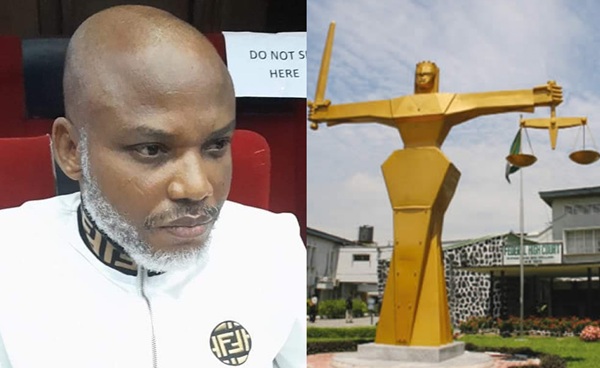676
By Lizzy Chirkpi
The Federal High Court in Abuja, on Friday, temporarily halted proceedings in the terrorism trial of Nnamdi Kanu to allow the detained leader of the Indigenous People of Biafra (IPOB) file his defence documents and depose to an affidavit.
Justice James Omotosho took the decision after the prosecution counsel, Chief Adegboyega Awomolo (SAN), requested a brief stand-down to enable Mr. Kanu complete the filing process.
The development followed Mr. Kanu’s complaint in open court that officials of the Department of State Service (DSS), where he had been in custody, had repeatedly prevented him from filing his legal documents.
“My lord, I don’t know how to say this. I have a process here to file, which has not been allowed for the last three days,” Kanu told the court.
“I have the process for my defence. I don’t know if my lord will allow me to file it for my defence,” he added.
Responding, Justice Omotosho asked the SSS operatives present in court to explain why the defendant was unable to file his documents.
One of the DSS officers informed the court that after Wednesday’s proceedings, Mr. Kanu had indicated his intention to file a process but could not do so before they left. He added that the next day, the agency received information that the IPOB leader still wanted to file the process.
According to the officer, there is a laid-down security protocol governing Mr. Kanu’s movements due to safety concerns.
“If the defendant wants to file a process in court, we have a standard procedure and protocol for his movement to guarantee his safety and the safety of others.
A letter is expected to be written by his former lawyers, who are now consultants, to the DSS management before he could be allowed,” the officer explained.
However, Mr. Kanu disagreed with the officer’s version of events, insisting that the SSS deliberately frustrated his efforts.
“What he just narrated was not correct,” Kanu said.
“When I was downstairs looking for the process on Wednesday, they said, ‘let us go, and you will be brought back the next day.’ I even asked them to allow court officers to bring the stamp so I could depose to the affidavit, but they refused.”
Prosecutor Awomolo, while urging calm, said he was unaware of the issue and suggested that communication between Kanu’s legal consultants and the DSS legal department could have resolved it.
“I was not aware of this. If they can talk to me or the Legal Department at the DSS, the matter would have been resolved. They equally have my phone number; they can call me,” Awomolo said.
After hearing all sides, Justice Omotosho ordered the court registrar and the commissioner for oaths to attend to Mr. Kanu immediately within the courtroom.
“The defendant will file here while we take other matters,” the judge ruled.
He also directed that whenever Mr. Kanu is required to depose to documents, court officials should be allowed to visit the DSS facility with official stamps to facilitate the process.
Mr. Kanu, who was expected to open his defence at Friday’s sitting, faces seven terrorism-related charges filed by the Nigerian government since 2015, linked to his campaign for Biafran independence.
After the prosecution closed its case with five witnesses in June, Mr. Kanu filed a no-case submission, arguing that the government failed to provide credible evidence. However, Justice Omotosho dismissed the application in September, ruling that the IPOB leader had a case to answer.
The trial has since suffered repeated adjournments, largely due to Kanu’s decision to dismiss his lawyers and represent himself, while insisting that the charges were invalid.
He maintains that the government’s case is based on a repealed terrorism law and has vowed not to enter a defence on what he describes as “nonexistent charges.”
Earlier this week, the judge had warned Mr. Kanu to “keep his gun powder dry” and focus on his defence rather than technical objections. The case has been adjourned several times to give him the opportunity to begin his defence after consulting with his legal consultants Nnaemeka Ejiofor, Aloy Ejimakor, Maxwell Okpara, and Mandela Umegborogu.



